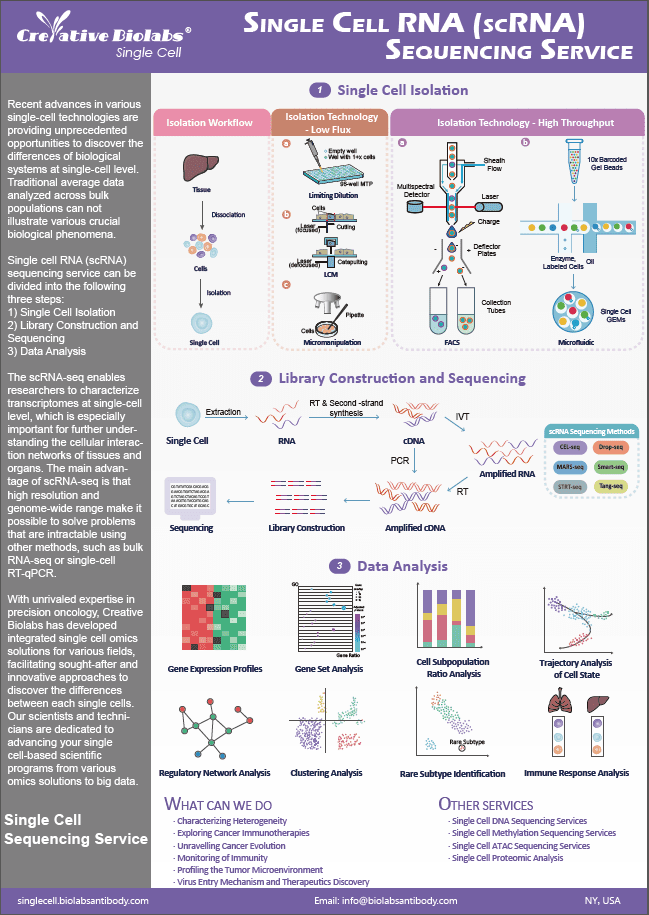Single Cell Proteomics Platform
The diversity and dynamics of the immune system pose many challenges for modern cancer treatment. Proteomics based on cell populations has been difficult to meet further research on the interaction of tumor cells with the immune system. To gain more insights for cancer immunotherapy, Creative Biolabs offers a comprehensive assessment of systemic immunity and the tumor microenvironment through single-cell proteomics. Single-cell proteomics technology enables systematic analysis of the protein levels of many single cells in the immune system and tumor microenvironment, allowing direct assessment of immune cell functional status and tumor-immune interactions, which can be used to assess immunotherapy efficacy and improve clinical outcomes.
Challenges for Cancer Immunotherapy
Cancer immunotherapy is a method of treating cancer by modulating an immune response, including monoclonal antibody (mAb) treatment and adoptive cell transfer (ACT) treatment for immune cells. mAb therapy, based on stimulating T cell function by blocking or activating immunoregulatory pathways, has achieved significant clinical responses in a variety of tumor types. However, not all patients can maintain a durable immune response after treatment. Therefore, it is critical to identify predictive biomarkers to select patients who will benefit from the therapy. However, the complexity of the tumor microenvironment and the dynamic nature of the immune response make this attempt difficult and requires a new tool to address immune and tumor-immune interactions at single-cell level.
Advantages for Single Cell Proteomics
Understanding cell characteristics and interactions from each other at single-cell level can provide more valuable information for intercellular heterogeneity in biological systems. Single-cell proteomics is the most common and effective method for studying cellular function and heterogeneity by systematically analyzing functional protein levels in many single cells from different cell types. Single-cell proteomics provides a clinical tool for assessing the immune system, immune cells manipulated in tumor microenvironment.
As an important molecule involved in various physiological processes in cells, protein is typically generated or released in multiple, transient pulses, and low abundance. Because genomic analysis lacks efficient PCR-like amplification techniques, for single-cell proteomics, Single Cell uses multiple analytical techniques to evaluate a range of important parameters from immune diversity, intratumoral heterogeneity, to intercellular communication. We developed diverse single cell proteomics platforms including:
Creative Biolabs is dedicated to helping our clients discover the secrets inside each single cell. If you have any questions about our single cell analysis service, you can contact us by email or send us an inquiry to find a complete solution.
Features & Benefits
-
High-Resolution Protein Profiling
The platform offers high-resolution profiling of proteins at the single-cell level.
-
Advanced Mass Spectrometry Integration
Integrates advanced mass spectrometry techniques, such as Orbitrap and TMT multiplexing.
-
High-Throughput Capability
Capable of high-throughput analysis, processing hundreds of single cells simultaneously.
-
Comprehensive Multi-Omics Integration
Supports integration with other omics data, such as genomics and transcriptomics.
-
Real-Time Data Acquisition
Enables real-time data acquisition and analysis.
Q&As
Q: How does the Single Cell Proteomics Platform work?
A: The platform integrates technologies such as Orbitrap mass spectrometry and TMT multiplexing. It involves isolating single cells, preparing protein samples, and conducting mass spectrometry analysis to detect and quantify proteins with high sensitivity and precision.
Q: How does the platform handle high-throughput analysis?
A: The platform is designed for high-throughput analysis, capable of processing hundreds of single cells simultaneously. This feature reduces the time and cost of proteomic studies, allowing for comprehensive analyses of large sample sets.
Q: What types of cells can be analyzed using the Single Cell Proteomics Platform?
A: The platform is versatile and can analyze various cell types, including immune cells, cancer cells, stem cells, and neurons. This broad applicability makes it useful for a wide range of biological and medical research areas.
Q: How does the Single Cell Proteomics Platform enhance biomarker discovery?
A: The platform enables the identification and quantification of proteins at the single-cell level, facilitating the discovery of novel biomarkers associated with specific cellular states or disease conditions. These biomarkers can be used for early diagnosis, prognosis, and treatment monitoring.
Q: How does Single Cell Proteomics benefit drug development?
A: By providing detailed protein profiles of individual cells, this platform helps identify cellular responses to drugs, uncovering mechanisms of action and resistance. This information is crucial for developing targeted therapies and improving the efficacy and safety of new drugs.
Resources
Search...


